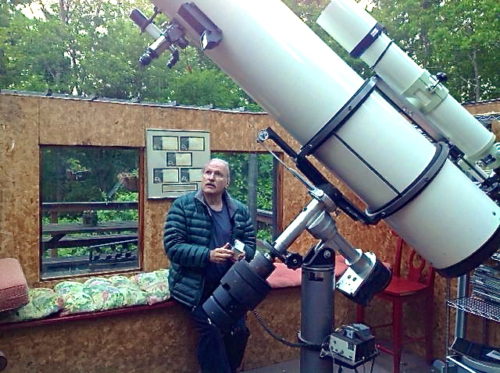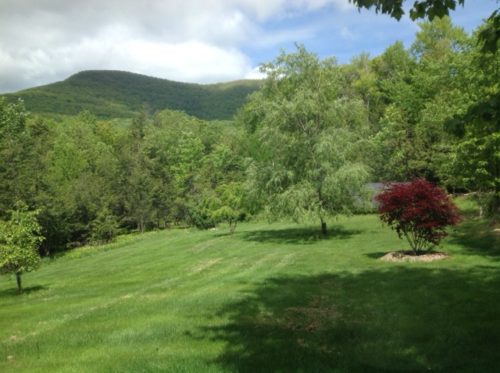You would think that the discovery of potentially habitable planets orbiting a nearby star would excite an astronomer. Bob Berman—a columnist for Astronomy magazine, the astronomy editor of the Old Farmers Almanac and the author of ten popular books—was unimpressed.

“For me this is kind of boring and unpleasant,” Berman said in response to a question about Trappist-1, a star roughly 40 light years away that was recently found to host seven terrestrial planets, three of which appear to orbit in the star-system’s habitable zone, where stable bodies of liquid water might form.
For starters, Berman explained, the idea that other stars could host planets similar to ours has actually been established knowledge for decades.
“There’s probably a billion Earth-mass planets in the galaxy,” he said. “There are planets everywhere. It may be interesting, but it’s yesterday’s news.”
The real kicker for Berman is the universal assumption that most Americans are captivated by the prospect of finding life on other planets.
“I don’t think people actually care about life,” he said. “Rather, they will care about human-like life, or something that’s cute like puppies, or something scary like an octopus-shaped alien with fangs. Something that will arouse their emotions.”
(The second installment in the “Guardians of the Galaxy” movie series had not yet premiered when Berman uttered those words. Anyone who has watched the film’s opening scenes will know that Berman is pretty much on the mark in his observations about the human imagination and giant, fanged octopuses.)
Berman said the kind of life that might actually flourish on other rocky, watery worlds is most likely very simple, like bacteria or algae. But will people care about that? He recalled the tepid and short-lived burst of interest that greeted the news back in 1996 that a meteorite of Martian origin appeared to contain fossilized microorganisms.
“The supposed life on the meteorite ALH84001 generated no buzz at all. No one was gathering around the water cooler at work to talk about that,” Berman said. “People didn’t care.”
This widespread lack of wonder and awe at life, regardless of its complexity, lies at the heart of Berman’s frustration with the Trappist-1 story.
“Who’s protesting that we are driving 200 species to extinction each and every day?” he asked. “That’s life, too!”
It would be a mistake to assume that Berman’s dismay reflects a belief that life is important because life is rare in our largely barren universe. On the contrary, according to Berman, life—specifically, conscious awareness—is the source of the universe and everything in it. Biocentrism, the notion that consciousness gives birth to the cosmos rather than the other way around, is the cornerstone of the two books that Berman has coauthored with Robert Lanza, a renowned medical researcher.
But rather than arriving at this perspective solely through a scientist’s use of deductive reasoning, Berman derives it, in part, from an experience he had during a three-week-long kensho—the Zen term for a temporary dissolving of the feeling of a “self” that’s somehow separate from the rest of the universe.
So in Berman’s view we’re not just undervaluing something that’s precious when we fail to appreciate life in all its forms. More than that, we’re not seeing the essence of what we really are.
“I saw this stuff directly,” he said. “You can talk about it until the cows come home, but if you experience it first-hand, that’s a whole different ball game.”
Berman had his spiritual opening while he was a student at Hunter College in New York City. In Beyond Biocentrism, the second book that he co-authored with Lanza, Berman briefly recounts the experience, which began while he was reading a chapter in a physiology textbook about how the brain processes visual information.
What’s not mentioned in the few paragraphs on Berman’s experience in Beyond Biocentrism is the ardent spiritual seeking that had possibly primed him for that insight. In addition to his physiology text, college-age Berman was also reading Alan Watts, D.T. Suzuki and other writers associated with Zen Buddhism in the West. And he was doing his best to cultivate Samadhi, the state of undistracted awareness at the heart of Zen practice.
“I wanted that so badly,” Berman said. “But no amount of meditation was succeeding. One time on the subway I remember using all of my physical strength to try to make my mind empty. My whole body was shaking with the effort! But, of course, nothing worked.”
Then one evening, when he said that his mind couldn’t have been further from Eastern thought, the opening happened on its own. Berman said that while the experience lasted, everything was suffused with an ecstatic bluish-white light, and he moved through his daily activities in a state of uninterrupted joy. At one point, during a lecture, he was able to watch his professor’s words forming before the professor spoke them.
No thoughts passed through Berman’s mind during those three weeks. Some of the far-out propositions he had read in his Zen books—that time along with birth and death are illusions, for example—now seemed obvious to him. Without those illusory markers of finitude and identity to stake out his equally illusory sense of self, that disappeared as well.
“There was no Bob,” Berman said. “That was clear as a bell, right down to my bones and marrow.”
He perceived the window was closing when Beatles songs began to drift through his mind. Then thoughts came back, and an existential heaviness that had been lifted during his kensho settled back onto him. Finally his sense of self returned.
“I was looking out at the world through my eyes again,” Berman said. “And it felt restricted. That sense of freedom and joy, certainty and clarity, was gone.”
While the authors of Beyond Biocentrism assure their readers that Berman’s experience was not drug-induced, the feeling of wonder that accompanied the “Satori experience” and the disappointment that followed its ending compelled Berman to chase the high. He went to India, where he lived for three years. (“They have it in the air there—it felt like coming home”). Ram Dass rented a beach home next to his, in the temple town of Puri.
Eventually he returned to the United States, began his career and settled in upstate New York, near Woodstock. Berman said he has had a brief reprise of that spiritual insight from his college years, but the opening lasted only for a few minutes. The most palpable legacy of his experience is what he described as a feeling of “non-doer-ship.”
Berman said, “Most of the time I have a sense of everything happening on its own. Decisions happen by themselves—I don’t feel I have to do stuff.”
The life-altering experience he had in his 20s has also inevitably shaped the way he presents cosmological ideas to popular audiences.
“Consciousness is really a bag of worms,” he said. “When I talk about space not being real or time not being real, I’m not going to say anything about Eastern religion.”
Instead, he points to the implications of Einstein’s theory of relativity as well as more recent work on quantum theory to show that consciousness is “baked into” nature. In other words nature and consciousness are just a single entity.
“But if you ask whether I have a Zen practice, it would depend on what year you’re talking to me.”

When asked what his life is like, Berman mentioned his morning routine, which involves sitting in the back of his house in Woodstock and taking in the current seasonal mantle of a field framed by distant mountains.
Simply appreciating life—it doesn’t get more Zen than that.
Enjoy this interview of Bob Berman on the Mysterious Universe podcast:
